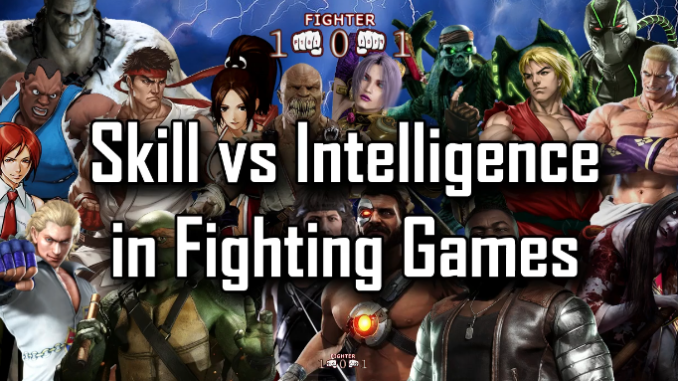
Winning in competitive environments, especially in fighting games, offers a unique thrill that’s hard to replicate. The adrenaline rush, the sense of accomplishment, and the sheer joy of outmaneuvering an opponent create a deeply addictive experience. However, determining who is truly the best player is a complex task, one often misunderstood by many players.
Defining Skill, Intelligence, and Mental Ability
When discussing what it means to be “good” at fighting games, opinions vary widely. Some believe it’s all about skill, while others emphasize intelligence or experience. To truly understand what makes someone the best, we must consider a logical approach involving key factors like mental ability, skill, and intelligence.
Mental ability is the power to learn or retain knowledge. Skill is the ability to effectively use that knowledge, while intelligence is the capacity to acquire and apply both. When two players are new to a fighting game, their skill levels are low, but if their opponents are equally inexperienced, intelligence plays a crucial role in determining the winner. On the other hand, if one player is highly skilled and the other is not, the skilled player will likely win, simply because they have a larger “bag of tricks” to draw from.
The Role of Talent in Competitive Play
The debate often arises when trying to measure who is better: the skilled player or the more intelligent one? In scenarios where both players are equally inexperienced or equally skilled, intelligence tends to tip the scales. But talent, while beneficial, is not always essential for winning. Talent refers to a natural aptitude, a knack for something that seems to put one ahead of the average person. However, being a talented player doesn’t necessarily mean you’re the best.
The Value and Challenges of Fighting Games
Fighting games are not just about skill and talent; they also test your mental abilities, patience, and discipline. Casual players should never feel discouraged by losing. Instead, they should understand that their limitations are often tied to the time they invest in the game. In contrast, players who dedicate themselves to mastering a fighting game by learning its mechanics, techniques, and match-ups often aim to reach competitive levels.
A player with thousands of online matches is more likely to defeat someone with only a few hundred matches. This discrepancy makes it difficult to judge talent accurately, as the less experienced player would need to catch up to their opponent’s level to make a fair comparison.
The Problem with Balance in Fighting Games
Balance issues in fighting games can create an illusion of talent. Two equally skilled players may still struggle to determine who is better if their character choices are imbalanced. This scenario is akin to bringing a knife to a gunfight, making it impossible to judge true skill accurately. At professional levels, choosing a character with the best chance of winning is a must, as pro players focus on maximizing their chances of victory.
Why Fighting Games Feel Personal
The competitive nature of fighting games often makes them feel more personal than other types of games. Losing to another player can feel like a challenge to one’s intelligence and talents, leading to frustration and even rage quitting. Unlike single-player games, where the challenge is set by a computer, fighting games require players to constantly adapt to their opponent’s actions, making each match unpredictable and often emotionally charged.
Keep the Fun in Fighting Games
Ultimately, playing fighting games should be about fun, even for those aspiring to become top players. Regularly evaluate how much enjoyment you’re getting from the game. If the fun outweighs the frustration, you’re on the right track. Remember, everyone is a beginner to some extent, and it’s essential to keep the experience enjoyable, whether you’re playing casually or competitively.
